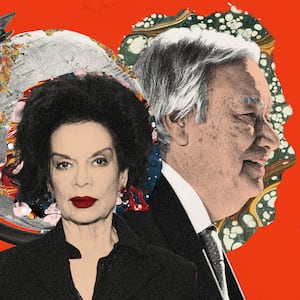Evan Gershkovich’s final story for The Wall Street Journal this year was headlined “Russia’s Economy Is Starting to Come Undone.” It was exactly the kind of nuanced, richly detailed story that Journal subscribers rely on.
From his post in Moscow, Gershkovich (who co-bylined the story with colleague Georgi Kantchev) interviewed Russian entrepreneurs who had to halt their expansion plans after Russia’s invasion of Ukraine triggered sanctions and spending cuts. “We understood we just had to survive,” one of the businessmen said.
Now that’s what Gershkovich is trying to do. He is confined to a small cell in a Russian prison described as notoriously isolating and a “terrifying symbol of repression.”
On the day his story on Russia’s economy appeared in print, March 29, Gershkovich was detained while on assignment in Yekaterinburg, Russia's fourth-largest city. Authorities claimed he was on an espionage mission, but he was merely doing his job as a journalist, attempting to speak with ordinary people and gauge public opinion. “He wanted to know what people think about the war,” a Russian journalist who knew Gershkovich’s travel plans told NBC News.
Gershkovich sensed the risks. The New Jersey native considered Moscow his second home and loved covering the country, but also acknowledged, in a July 2022 tweet, that “reporting on Russia is now also a regular practice of watching people you know get locked away for years.” One of the Journal’s first stories about his detention noted that “the 31-year-old journalist who had covered the rapidly escalating new era of state hostage-taking has suddenly become the face of it.”
Gershkovich is a hero for what he is enduring—and his colleagues are engaged in heroic efforts to win his release.
Journal editor-in-chief Emma Tucker was still learning her way around the newsroom, in her eighth week on the job, when Gershkovich was snatched. Fighting for his freedom became a round-the-clock effort, and a herculean one across the Journal and its parent company, Dow Jones, a gem within Rupert and Lachlan Murdoch’s media empire.
The Murdochs deserve criticism for dozens of reasons, but this is not one of them; Rupert and Lachlan have been steadfast in demanding Gershkovich’s release and have used many Journal and Fox assets to do so.
Through interviews, stories and social media campaigns, Tucker and other Journal leaders ensured that Gershkovich’s plight was front and center, not just for a day or two, but for months. I searched my inbox in mid-December and found more than 70 #IStandWithEvan emails from the Journal’s top-notch comms team.
News executives at other outlets have told me that the Journal’s ceaseless campaigning is a blueprint if, God forbid, one of their own reporters is seized. “We are doing everything in our power to get him back,” the Journal’s special website dedicated to Gershkovich says.
In October, Tucker shifted D.C. bureau chief Paul Beckett into a new full-time get-Evan-home role. “Let’s hope it is a short-term assignment,” Beckett posted on X. Never has an editor wanted to make his own position obsolete more fervently.
Other key players behind the scenes have included Journal publisher and Dow Jones CEO Almar Latour; Dow Jones EVP and general counsel Jay Conti; chief digital editor for international Gráinne McCarthy; and standards and ethics editor Emma Moody.
“As the holiday season gets into full swing, we are persistently aware that Evan is sitting in a Russian prison, unable to spend the holidays with his friends and family,” Moody wrote in a Dec. 20 update to the staff. “The U.S. ambassador to Russia visited Evan on Friday, a day after President Vladimir Putin said Russia wants to reach an agreement on his return.”
There are encouraging indications from both American and Russian officials that “they want to do a deal,” Moody added. “Let’s hope that happens sooner rather than later. In the meantime, we can share Evan’s story far and wide and do our part to raise awareness of his case.”
You can view the complete Heroes 2023 series here.









